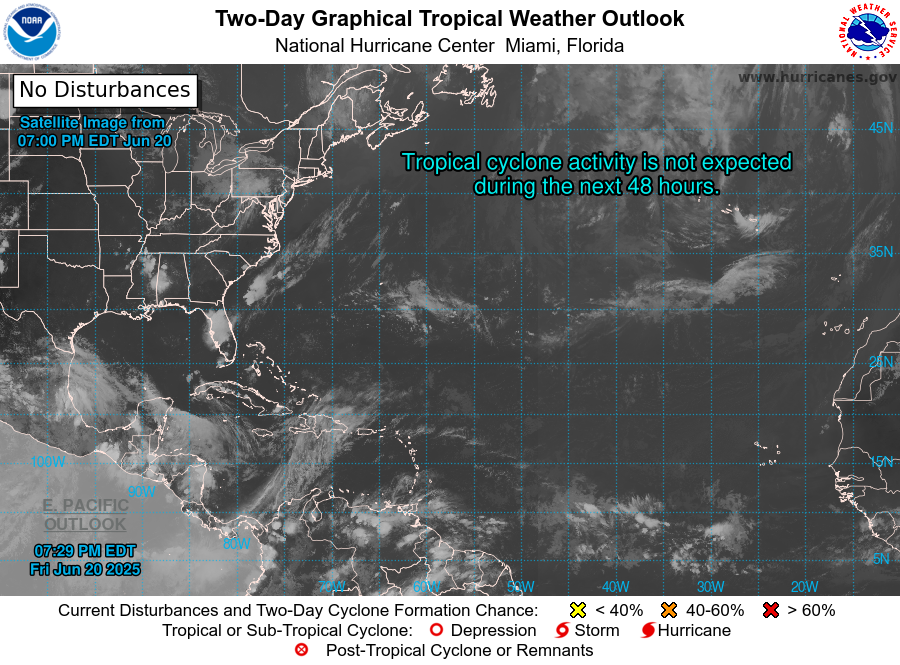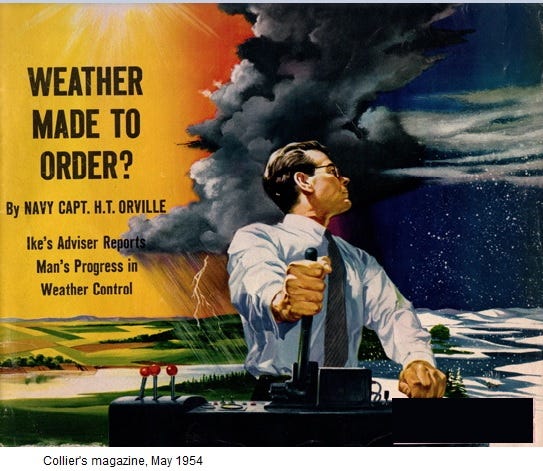Coming up on the end of month 2 of the 2022 hurricane season and seeing this map for something like 30 of the last 54 days:

We hit the link-vault for some action.
From James James Pethokoukis' Faster, Please! substack, August 31, 2021:
Also: What Soviet science cities and the Spanish Inquisition tell us about long-termism
In This Issue
The Long Read: They promised we could control hurricanes, but instead we got Twitter
The Short Read: The past isn't even the past: What Soviet science cities and the Spanish Inquisition tell us about long-termism
The Micro Reads: space elevators, Tesla Bots, the metaverse, and more. . .
The Long Read
🌧 They promised we could control hurricanes, but instead we got Twitter
Maybe we’ve made enough progress with air taxis that “They promised flying cars, but instead we got Twitter” doesn’t work anymore as a snarky metaphor for technological stagnation. But there are other postwar expectations about tech progress that could serve as a substitute. “They promised intelligent apes, but instead we got Twitter” would be one option. Neither the Planet of the Apes franchise (five films from 1968 through 1974) nor the 1963 book it was based on came purely from imaginative writers. Forecasts about artificially enhanced ape intelligence were a staple of the era’s futurist predictions. For instance: A 1964 RAND Corporation survey of experts pegged 2020 as the median prediction as to when smart simians would be available for “low-grade” labor or even military reconnaissance and combat operations. Clearly a different vision of how (human) driverless cars might work.
Or this option: “They promised weather control, but instead we got Twitter.” If you were a naval strategist in the 1960s who found yourself musing about the tactical implications of weather control — such as the ability to whip up a hurricane and hurl it at an enemy fleet — scientists offered encouraging news. The 1968 book Toward the Year 2018 was a compilation of expert forecasts, published by the Foreign Policy Association. It included an entire chapter on weather, written by Thomas F. Malone, director of research at Travelers Insurance and chair of the Committee on Atmospheric Sciences of the National Academy of Science. Malone believed “the next fifty years will be crucial for controlling, to a significant extent, this particularly sensitive part of our physical environment.”
Regional weather modification and control — increase rainfall, reduce hail, suppress lighting — seemed quite possible, with even wide-scale weather control, including hurricanes, given a 50-50 chance over the next half century. (That RAND survey found a median prediction of 1990 as to when we would be capable of enough weather control to destroy an enemy’s crops or flood its territory.) Malone seemed more concerned about international agreements to coordinate weather inventions than the potential success of those interventions. Little wonder, given such high confidence, that the immediate postwar decades were a boom time for experimentation. One of the most well known US government projects was Project Stormfury, an attempt to weaken hurricanes by having aircraft seed them with silver iodide.
Flash forward 50 years: We’re not doing much intentional weather control, although we are obviously affecting the climate, which does affect the weather. The National Oceanic and Atmospheric Administration gives a handy rundown of the many failed ideas, such as the Stormfury Project. Yet climate engineering is again front of mind in a way it hasn’t been since the 1960s. This is due to growing awareness of climate change, as well as greater recognition that humanity is unlikely to take the steps necessary to minimize global warming through reduced carbon emissions from lifestyle changes. And every time there’s a big hurricane, such as the one which slammed into Louisiana over the weekend, concern about extreme weather intensification, well, intensifies...
...MUCH MORE
- "Manipulating the Climate: What Are the Geopolitical Risks?
- U.S. Army Mad Scientist Blog: "Shén fēng: Military Use of Weather Modification Technology"
- Weather as a Force Multiplier: Owning the Weather in 2025"—U.S. Air Force
The head of Iran's Civil Defense Organization claims Israel is 'working to ensure clouds entering Iranian skies are unable to release rain,' insisting this was confirmed by an Iranian scientific study; but head of Iran's meteorological service says 'it is not possible for a country to steal clouds.'...MORE
The World War II typhoon that hit the U.S. Third Fleet on Keith Richards' first birthday was one of the worst disasters in U.S. Naval history:
Via Wikipedia's Typhoon Cobra page:
...3rd Fleet damage
- USS Hull - with 70% fuel aboard, capsized and sunk with 202 men drowned (62 survivors)[3]
- USS Monaghan - capsized and sunk with 256 men drowned (six survivors)[3]
- USS Spence - rudder jammed hard to starboard, capsized and sunk with 317 men drowned (23 survivors) after hoses parted attempting to refuel from New Jersey because they had also disobeyed orders to ballast down directly from Admiral Halsey[3]
- USS Cowpens - hangar door torn open and RADAR, 20mm gun sponson, whaleboat, jeeps, tractors, kerry crane, and 8 aircraft lost overboard. One sailor lost.[3]
- USS Monterey - hangar deck fire killed three men and caused evacuation of boiler rooms requiring repairs at Bremerton Navy yard[3]
- USS Langley - damaged[3]
- USS Cabot - damaged[4]
- USS San Jacinto - hangar deck planes broke loose and destroyed air intakes, vent ducts and sprinkling system causing widespread flooding.[3] Damage repaired by USS Hector[5]
- USS Altamaha - hangar deck crane and aircraft broke loose and broke fire mains[3]
- USS Anzio - required major repair[3]
- USS Nehenta - damaged[4]
- USS Cape Esperance - flight deck fire required major repair[3]
- USS Kwajalein - lost steering control[3]
- USS Iowa - propeller shaft bent and lost a seaplane
- USS Baltimore - required major repair[3]
- USS Miami - required major repair[3]
- USS Dewey - lost steering control, RADAR, the forward stack, and all power when salt water shorted main electrical switchboard[3]
- USS Aylwin - required major repair[3]
- USS Buchanan - required major repair[3]
- USS Dyson - required major repair[3]
- USS Hickox - required major repair[3]
- USS Maddox - damaged[4]
- USS Benham - required major repair[3]
- USS Donaldson - required major repair[3]
- USS Melvin R. Nawman - required major repair[3]
- USS Tabberer - lost foremast[6]
- USS Waterman - damaged[4]
- USS Nantahala - damaged[4]
- USS Jicarilla - damaged[4]
- USS Shasta - damaged "one deck collapsed, aircraft engines damaged, depth charges broke loose, damaged "
